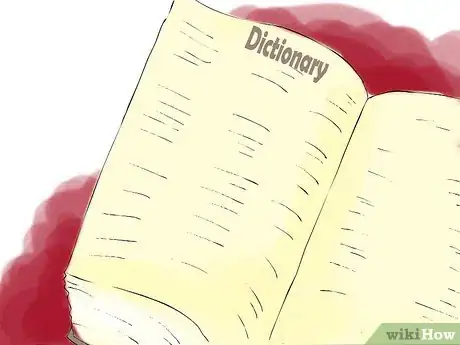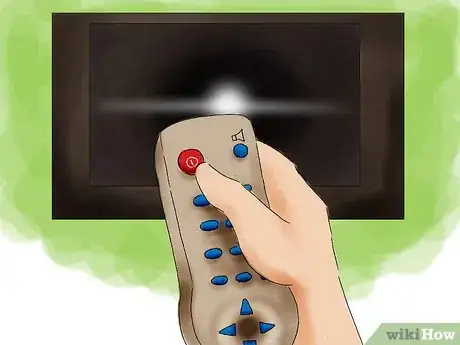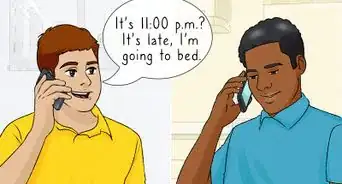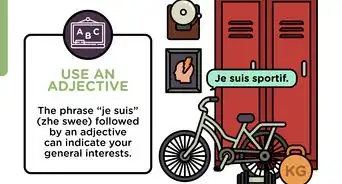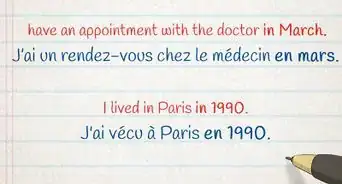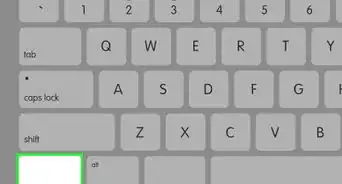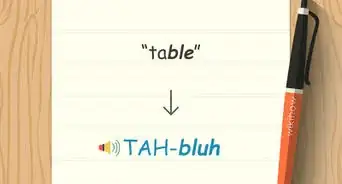This article was co-authored by Lorenzo Garriga. Lorenzo is a native French speaker and French language connoisseur. He has many years of experience as a translator, writer and reviewer. He is also a composer, pianist, and globe-trotter, who has been travelling the world on a shoestring for almost 30 years with a backpack.
wikiHow marks an article as reader-approved once it receives enough positive feedback. In this case, 92% of readers who voted found the article helpful, earning it our reader-approved status.
This article has been viewed 200,446 times.
Whether you are just a beginner, or someone who has spent a number of years learning French, it is important to keep your language skills well honed, and to find ways to improve these skills as often as possible.
If you have at the very least a basic knowledge of French, then you can follow these steps to advancing your knowledge of a language that is spoken in 57 countries and territories around the world.[1]
Steps
-
1Work on your pronunciation. Smooth flowing French is gained through continual practice at acquiring a good accent. Good pronunciation helps to ensure that you are easily understood and will enable you to enjoy speaking the language more fluently. Ways to improve your pronunciation include:
- Listen to native French speakers and repeat what they say. Watch a good French movie and imitate your favorite actor's accents. Listen to native French speakers on your iPod or MP3 player as you're traveling to work, and repeat what they say (when appropriate).
- Sing French music. Download your favorite songs and sing along. Music is an excellent method by which to perfect accent, and most times, you won't even notice the effort involved.
- Ensure that you have a good French teacher. If you're not studying as part of your college curriculum, take up French classes after work, or on the weekends. Your teacher should be able to help correct your pronunciation by picking out your weaker points and giving you specific exercises to improve your intonation, inflexion, and sound linking.
-
2Revise your grammar constantly. Even though you have already learned certain grammar points, it continues to be important to revisit your grammar learning until the individual points become second nature. If it helps, think of grammar like a math problem--by adding a certain word, the equation will be complete! This can be made a lot more fun and engaging if you use multimedia to assist:
- Use your iPod or MP3 player to listen to grammar drills. Do this while exercising, traveling, relaxing on your bed, etc.
- Use computer games and exercises to improve your grammar. There are many games and exercises available for free online, or you can purchase CD-Roms for your computer. Do a search of "French grammar games", "French spelling games", "French verb games", etc., and see what suits your interests most. Look for games that French speakers play - these will be an excellent way to improve your French.[2]
Advertisement -
3Increase your vocabulary. As with your native language, aim to make learning vocabulary a lifelong learning process. While learning vocabulary gets easier the more you do it, and the faster you are able to work out meanings by context and association, it can be helpful to continue learning vocabulary as a discrete exercise in its own right. The best ways to do this include:
- Keep a notebook for writing down words you discover when reading, or listening to some other kind of media. You can choose to look them up later rather than constantly interrupting a good read with dictionary hunting. It is helpful to use categories for the words, such as travel, clothes, body, fashion, car, movies, etc. to make finding the words easier, and to provide contextual association in your mind.
- Make use of Post-It notes to write down the names of household items.
- Create a scrapbook. Cut out pictures of items by theme and add the French words to them. A craft exercise on the one hand, a French lesson on the other!
- Use events that interest you to provide intrinsic motivation for learning new words. For example, if you're a soccer (football) fan, why not watch the games in French, and learn new words?[3]
- When you learn a new word in your native language, look it up in French at the same time.
- Read the instructions accompanying your appliances and software in French. Most manuals now come in a range of languages, making it easy for you to learn new technological or technical terms quickly, with the ability to cross-check with the English version.
- Aim to learn 5 new words every day - that amounts to 35 new words a week, 1820 words a year!
- Buy a visual dictionary in French. It does not need to have any English in it, although bilingual visual dictionaries do exist. This is an inspiring and very useful way to learn a wide range of vocabulary and is particularly helpful for technical terms that you might need for work, or for a hobby.
-
4Surround yourself with the language. Whether it's books, radio, the Internet, or TV, every form of media will open up your learning possibilities and enhance the experience for you. If there isn't much French in your area, download podcasts. You'll find yourself understanding things much better and remembering words that you haven't seen in a while if you mix up the media approaches to learning.
- Read French as often as possible. Reading will expand your vocabulary and broaden your immersion in the language. You will learn easily while reading because you're enjoying yourself. Just be sure to pick books that interest you, fiction or non-fiction. Or, if books are not your thing, try reading wikiHow in French. (You can find these pages in the wikiHow worldwide section of wikiHow's homepage).
- Many DVDs now come with the option of French. Switch to French when watching - whether it is dubbed or subtitled, you're still learning using an engaging medium.
- Listen to French radio stations. There are hundreds of stations broadcasting in French and many of them can be easily accessed online.[4] You can also check out what French options are available on foreign language stations in your location.
-
5Find a conversation partner. Plenty of French speakers would like to improve their English in return for helping you with your French. It's great practice, and a native speaker can easily set you straight on all sorts of details that never appear in textbooks. You can practice with a conversation partner in a number of ways:
- As pen-pals over the Internet using email, chat clients or IRC;
- Using social networking clients (use Twitter, etc., only in French);
- Get onto a French wiki and edit only in French and communicate with the other people on the site in French;[5]
- Talk with French pals using software like Google Talk or Skype; or,
- If you find somebody in your area, have conversations regularly, in person.
- Most importantly, don't just talk. Remember to also perfect your French listening skills. Being a language that is spoken quickly, with much liaison, listening for understanding French well is a vital skill.
-
6Go French for the weekend. Grab a buddy who has a more advanced level of French, or someone who is a native French speaker, and aim to speak nothing but French with them for a day or two over the weekend. Go shopping, dining, and having fun--all in French.
-
7Travel. Visit a French speaking country and soak up the language and culture all at once. Don't just limit yourself to France or Belgium - if you live in North America, Quebec is on your doorstep, and with there are many other French speaking countries, regions, and cultures around the world in Africa, the Pacific, the Caribbean, etc. It's a good excuse for a vacation and a learning experience!
- Book into a language school in a French country or city. Try to live with a local family so that you speak French all the time.
- Look for volunteer work, or casual work. Working is an excellent way to improve your ability in another language quickly. If you get to work in a busy industry, such as waiting or cooking, you will be compelled out of necessity to improve your French very quickly.
- Teach English as a Second Language in a French-speaking country. You will need to have a good grasp of both languages for this one, and as you teach, you will definitely learn!
-
8Understand that language learning is also cultural learning. While learning and improving your second language skills, it is equally important to improve your cultural understanding.
- Read French history. Read widely, because French history extends well beyond France.
- Learn as much as you can about French cultural works, such as art, fashion, and movies.
- Dine on French food occasionally, or learn to make your own. Read up on French cuisine and history.
- Learn about French politics. Again, don't focus simply on France but remember to look at other French-speaking countries.
Expert Q&A
Did you know you can get expert answers for this article?
Unlock expert answers by supporting wikiHow
-
QuestionHow do I become fluent in French?
 Lorenzo GarrigaLorenzo is a native French speaker and French language connoisseur. He has many years of experience as a translator, writer and reviewer. He is also a composer, pianist, and globe-trotter, who has been travelling the world on a shoestring for almost 30 years with a backpack.
Lorenzo GarrigaLorenzo is a native French speaker and French language connoisseur. He has many years of experience as a translator, writer and reviewer. He is also a composer, pianist, and globe-trotter, who has been travelling the world on a shoestring for almost 30 years with a backpack.
French Translator & Native Speaker
-
QuestionWhat are the rules for learning adjectives?
 Community AnswerThe adjectives change depending on the number/gender of the objects they're describing. But not all, and there are some exceptions. One tip to remeber is BANGS (Beauty, Age, Number, Goodness, Size). Any adjectives that fall under the BANGS goes before the noun.
Community AnswerThe adjectives change depending on the number/gender of the objects they're describing. But not all, and there are some exceptions. One tip to remeber is BANGS (Beauty, Age, Number, Goodness, Size). Any adjectives that fall under the BANGS goes before the noun. -
QuestionHow long will it take me to improve my French?
 Community AnswerIf you practice regularly and consistently, I would expect your French to start improving within a few weeks or months.
Community AnswerIf you practice regularly and consistently, I would expect your French to start improving within a few weeks or months.
Things You'll Need
- Internet access
- Up-to-date grammar books
- Up-to-date dictionary
- Notebook
- DVDs, books, other media
- iPod or MP3 player, free French podcasts
- Travel ideas
- Pals to speak French with
References
- ↑ Wikipedia, French Language, http://en.wikipedia.org/wiki/French_language
- ↑ The French Corner, http://www.thefrenchcorner.net/2007/08/improve-your-french-with-online-games.html
- ↑ BBC, French footie lingo, http://www.bbc.co.uk/languages/french/mafrance/html/football/vocab.shtml
- ↑ French Radio, http://www.learn-french-help.com/French-radio.html
- ↑ wikiHow français, http://fr.wikihow.com/Accueil
- Wordreference, http://www.wordreference.com -- a good online English-French and French-English dictionary, including forums where you can ask questions


